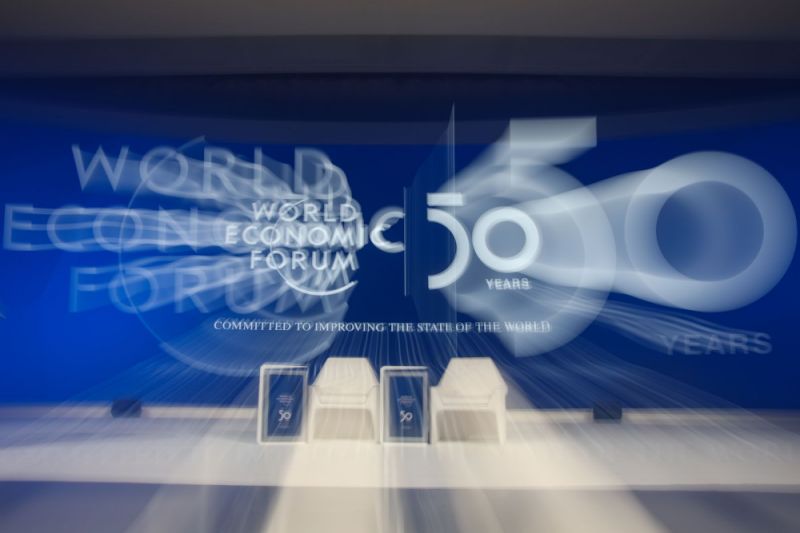
(Bloomberg) — Sign up here to receive the Davos Diary, a special daily newsletter that will run from Jan. 20-24.
The rich and powerful are in Davos, Switzerland, for the World Economic Forum’s 50th annual meeting, and the gathering is being closely watched to see how the global elite aims to tackle problems they helped create, above all climate change.
Swedish climate activist Greta Thunberg, who called a climate strike for Friday near the forum, slammed the global elite for failing to treat climate change as a crisis.
The economy is also in focus on the final day, and European Central Bank President Christine Lagarde told Bloomberg TV investors shouldn’t assume that current monetary policy is locked in for the foreseeable future just because officials are reviewing their strategy. Lagarde later takes part in a panel discussion on the global outlook.
To get all the highlights delivered to your inbox, sign up for the Davos Diary newsletter. Here’s the latest (time-stamps are local time in Davos):
Thunberg Says Davos Has Failed on Climate (10:46 a.m.)
Swedish activist Thunberg used a Friday press conference to declare the World Economic Forum a failure on addressing the case for climate action she first made at Davos last year.
“Before we came here, we had a few demands for the WEF, and the demands have been completely ignored,” she said. “Of course we expected nothing less,” the 17-year-old said.
“We must remember that as long as we don’t treat this crisis as a crisis, as long as science is ignored, we won’t be able to solve this crisis,” she said, speaking alongside other young climate activists.
She interjected during remarks by one of her fellow activists to specify that the urgency they all felt around climate action didn’t mean the end is near. “Of course, this is not the last year we have,” she said.
Germany Maintaining ‘Strong’ Investment: Scholz (10:40 a.m.)
German Finance Minister Olaf Scholz said the country has “a very expansionary fiscal policy” and last year’s budget surplus will give Chancellor Angela Merkel’s government room to maintain strong investment.
“We are already doing a lot of things which will help to expand investments,” Scholz said in an interview with Bloomberg TV. “Now with the surplus we have all the possibility to be strong in this field as anyone asks us to be and as we really want ourselves.”
A trade deal between the U.S. and the European Union is possible “really soon,” although it will require “very hard work,” Scholz said.
“It is absolutely important that we do not build trade barriers,” he added. “The wealth of the nation is better when we have a rules-based free trade.”
Villeroy Calls for Flexible, Credible Inflation Target (10:31 a.m.)
The ECB should ensure in its strategic review that its inflation target is “symmetric, flexible and credible,” Governing Council member Francois Villeroy de Galhau said.
To be credible the ECB must explain its inflation target to households and businesses and listen to them about their inflation expectations, Villeroy said in a Bloomberg TV interview. The strategic review should go beyond market professionals to households and businesses because they are price makers and wage-setters, he added.
Centeno Sees Germany Stepping Up Spending (10:10 a.m.)
To spur economic activity, euro-area countries that can spend more need to, and Germany is showing signs that it is ready to play its part, according to Eurogroup President Mario Centeno.
“We know that some countries have more space than others to act,” Centeno said in a Bloomberg TV interview. “Germany is one of those countries that can act, and actually we see some action from the German side.”
Recent investment in the rail sector “goes precisely in that direction,” Centeno added. “It’s public investment, connected with climate action. I expect more of those actions to be taken in the course of 2020, so that 2020 can finally see this acceleration of the global economy, and Europe can also play a role in that.”
EU, China, Brazil Form Trade-Dispute Alliance (10 a.m.)
The European Union and a group of 16 nations that includes China and Brazil are forming an alliance to settle trade disputes among themselves using an interim appeal-arbitration mechanism at the World Trade Organization.
“We will work towards putting in place contingency measures that would allow for appeals of WTO panel reports in disputes among ourselves,” according to a copy of a joint declaration obtained by Bloomberg.
The development marks an advance of the EU’s backup plan for settling international trade disputes now that the WTO appellate body is paralyzed. WTO delegates meeting in Davos are expected to announce the arrangement later Friday.
“We believe that a functioning dispute settlement system of the WTO is of the utmost importance for the rules-based trading system, and that an independent and impartial appeal stage must continue to be one of its essential features,” according to the document.
ESM Chief Sees More People Now in Favor of Stronger Euro Role (9:05 a.m.)
The international role of the euro is becoming increasingly the focus of debate in Europe, according to European Stability Mechanism Managing Director Klaus Regling.
“More people are now in favor of having a stronger role for the euro which is partly the answer to the U.S. current administration withdrawing from multilateralism,” Regling said in a Bloomberg TV interview.”Europe believes in multilateralism, and one way to strengthen European sovereignty is the international role of the euro.”
Tech CEOs Dodge Issues by Warning About AI (9 a.m.)
Technology’s most influential leaders have a new message: It’s not us you need to worry about — it’s artificial intelligence.
Two years ago big tech embarked on a repentance tour to Davos in response to criticism about the companies’ role in issues such as election interference by Russia-backed groups; spreading misinformation; the distribution of extremist content; antitrust violations; and tax avoidance. Uber Technologies Inc.’s new chief even asked to be regulated.
These problems haven’t gone away, but this time executives warned that AI that must be regulated, rather than the companies themselves.
“AI is one of the most profound things we’re working on as humanity. It’s more profound than fire or electricity,” Alphabet Inc. Chief Executive Officer Sundar Pichai said in an interview. Comparing it to international discussions on climate change, he said, “you can’t get safety by having one country or a set of countries working on it. You need a global framework.”
German Health Minister Says China Virus Less of a Threat (8:45 a.m.)
China is more transparent and more aggressive in attempting to control the coronavirus outbreak compared with SARS, and that’s helping the international community better prepare to deal with the situation, according to German Health Minister Jens Spahn.
“We are prepared and keep on preparing, but at the same time I think we have to put into perspective,” Spahn said in a Bloomberg TV interview. “There’s a big difference to SARS.”
Coronavirus the ‘New Norm’: Axa’s Buberl (8:30 a.m.)
Axa SA Chief Executive Officer Thomas Buberl said outbreaks like the coronavirus are the “new norm” and there will be more viruses popping up due to climate change.
“We always learn in these emergency situations and then forget again when it’s gone,” Buberl told Bloomberg TV.
“We need to remind ourselves that the environment is changing, it is getting warmer everywhere and therefore new viruses will pop up,” he added. “Going forward, the implication of climate on health is something that we need to study more and need to understand better.”
VW’s Diess Upbeat on Battle With Tesla (8:10 a.m.)
Volkswagen AG Chief Executive Officer Herbert Diess said he’s optimistic the German car giant can keep pace with Tesla Inc. in the electric-car market and even overtake Elon Musk’s company at some point.
“I think it’s an open race” to define the car of the future, Diess told Bloomberg TV. “I would take Tesla more seriously than Google and there are also from our peers some very competitive companies like Toyota.”
This year will be “very difficult” for automakers, with global demand “basically flat” and tighter emissions regulations coming into force in Europe, Diess said. “We’re basically optimistic, but it will be a very demanding year for the industry,” he added.
Lagarde: ECB Policy Not Necessarily on Autopilot (7:30 a.m.)
Lagarde said that market observers should not assume that the ECB’s monetary policy will be on “autopilot” for the next two years.
“To those who think that it’s autopilot, I think that’s ridiculous,” Lagarde said in an interview with Bloomberg TV’s Francine Lacqua. “There is a forward guidance, which is strong, which is setting a very clear timetable that is fact dependent. But let’s look at the facts. Let’s look at how the economy evolves.”
Lagarde added that if markets are interested in what happens over the next 12 months, “they should not pay too much attention” to the ECB’s strategy review.
“To those who say it’s going to be completely static and stable for 12 months I say watch out, because things change and we might have different signals and we might reconsider,” she said. She conceded that the goal of completing the review by the end of this year is “ambitious.”
Carrie Lam Courts Elite With Dim Sum (5:39 a.m.)
Carrie Lam hosted 200 business and political leaders for dim sum and cocktails at a Swiss ski resort to reassure them that Hong Kong’s future is bright.
The city’s leader said that Hong Kong is still open for business, despite paralyzing protests and an economy in recession. She also said that officials back home are working to contain the coronavirus that’s killed more than two dozen people in China and infected hundreds of others. Hong Kong has identified two cases.
In a room decorated with gold candles and red Chinese lanterns for Lunar New Year, Lam said her government “will safeguard Hong Kong’s fundamentals, including the rule of law.” She was also “fully confident of the city’s future,” according to a readout from her office.
Singapore Leader Says Rebound Depends on Calm (1:57 a.m.)
Singapore Prime Minister Lee Hsien Loong said the city state’s economy could improve in 2020 only if any number of global risks don’t materialize, particularly emanating from the U.S.
Lee said that he’s “relieved” that Singapore’s economy escaped recession in 2019. The government’s growth forecast for this year — anywhere from 0.5%-2.5% — indicates “we really don’t know” how things will pan out, he said in an interview with Bloomberg’s Editor-in-Chief John Micklethwait.
“That’s the range of what our economy is capable of, but whether we realize that capability, that potential, depends on international conditions,” Lee said. “If there’s a blowout between China and America, or if there’s something happening in the Middle East, either with Iran or with Syria, then all bets are off.”
Soros: Facebook Conspiring to Re-Elect Trump (00:18 a.m.)
Billionaire George Soros said that nothing is keeping Facebook Inc. from spreading disinformation and the company may be in cahoots with U.S. President Donald Trump to get him re-elected.
“I think there is a kind of informal mutual assistance operation or agreement developing between Trump and Facebook,” Soros, 89, said Thursday. “Facebook will work together to re-elect Trump, and Trump will work to protect Facebook so that this situation cannot be changed and it makes me very concerned about the outcome for 2020.”
Soros didn’t offer any evidence for his claim. “This is just plain wrong,” Facebook spokesman Andy Stone said in response.
Friday Highlights
10:30 a.m. | Central banking panel with ECB Governing Council members Francois Villeroy De Galhau and Klaas Knot10:30 a.m. | QuickTake panel: How can the world break free from single-use plastics? Join us for a discussion and DM us questions: @QuickTake11:30 a.m. | Global Economic Outlook panel with ECB President Lagarde, BOJ Governor Kuroda, IMF’s Georgieva, U.S. Treasury Secretary Mnuchin, German Finance Minister Scholz11:30 a.m. | Austrian Chancellor Sebastian Kurz gives special addressBe on the lookout for Bloomberg Television’s interviews withVolkswagen CEO DiessBank of France Governor Villeroy de GalhauAustrian Chancellor Kurz
Thursday Catchup
‘Matter of survival’ | Germany’s Angela Merkel called on world leaders to work together to fight global warming and take the views of concerned young people seriously, saying time is running out to protect the planet. Meanwhile, the head of Merkel’s party said Germany needs to speed up the process of spending government funds.Back to school | U.S. Treasury Secretary Mnuchin questioned whether Swedish activist Greta Thunberg is qualified to talk about economic issues linked to climate change and told 17-year-old to go and study the subject in college.Trade flare-up | The U.S. and Europe looked set for a renewed clash over everything from car tariffs to digital taxes in a sign that a new American focus may be emerging following Trump’s trade truce with China.Waste-free economy | When British yachtswoman Ellen MacArthur was promoting the idea of the circular economy on the sidelines of Davos in 2012, the big attraction was curiosity about what she was up to after her sailing career. Eight years on, MacArthur’s vision is taking hold at the WEF, and firms such as Adidas, Unilever and BlackRock are embracing it.Davos laggards | The global 1% once again have ascended the Swiss Alps to breathe the rarefied air in Davos, but in the stock market they’re anything but elite.Speed reads | Turkey says central bank as independent as the Fed | Standard Chartered says few have left Hong Kong | Formula One says overhaul deal talks in final stages | Facebook says Bezos hack highlights vulnerabilities
–With assistance from Shelly Banjo, Dandan Li, Michelle Jamrisko, Katia Porzecanski, Sarah Frier, Francine Lacqua, Geraldine Amiel, Haslinda Amin, Viktoria Dendrinou, Giles Turner, Bryce Baschuk, Joao Lima, Aaron Rutkoff and Javier Blas.
To contact the reporters on this story: Chris Reiter in Berlin at [email protected];Iain Rogers in Berlin at [email protected]
To contact the editors responsible for this story: Chad Thomas at [email protected];Simon Kennedy at [email protected]
<p class="canvas-atom canvas-text Mb(1.0em) Mb(0)–sm Mt(0.8em)–sm" type="text" content="For more articles like this, please visit us at bloomberg.com” data-reactid=”96″>For more articles like this, please visit us at bloomberg.com
<p class="canvas-atom canvas-text Mb(1.0em) Mb(0)–sm Mt(0.8em)–sm" type="text" content="Subscribe now to stay ahead with the most trusted business news source.” data-reactid=”97″>Subscribe now to stay ahead with the most trusted business news source.
©2020 Bloomberg L.P.









